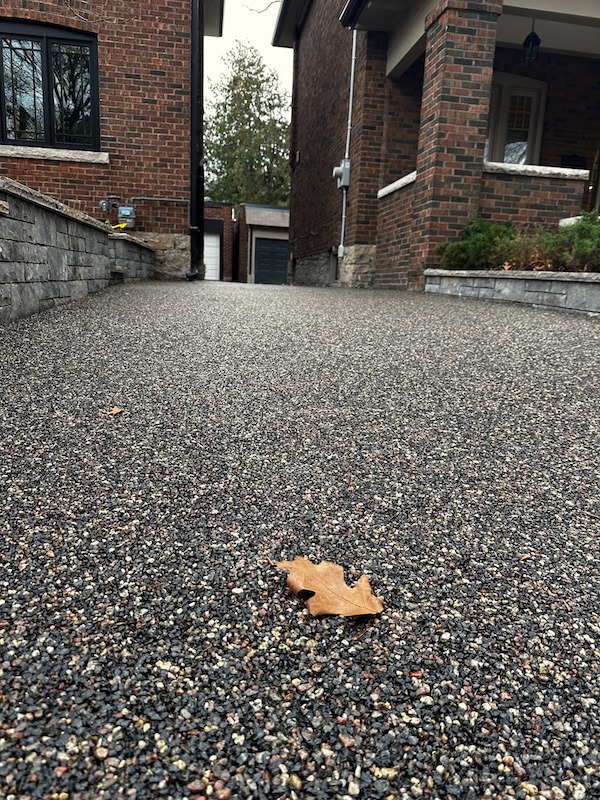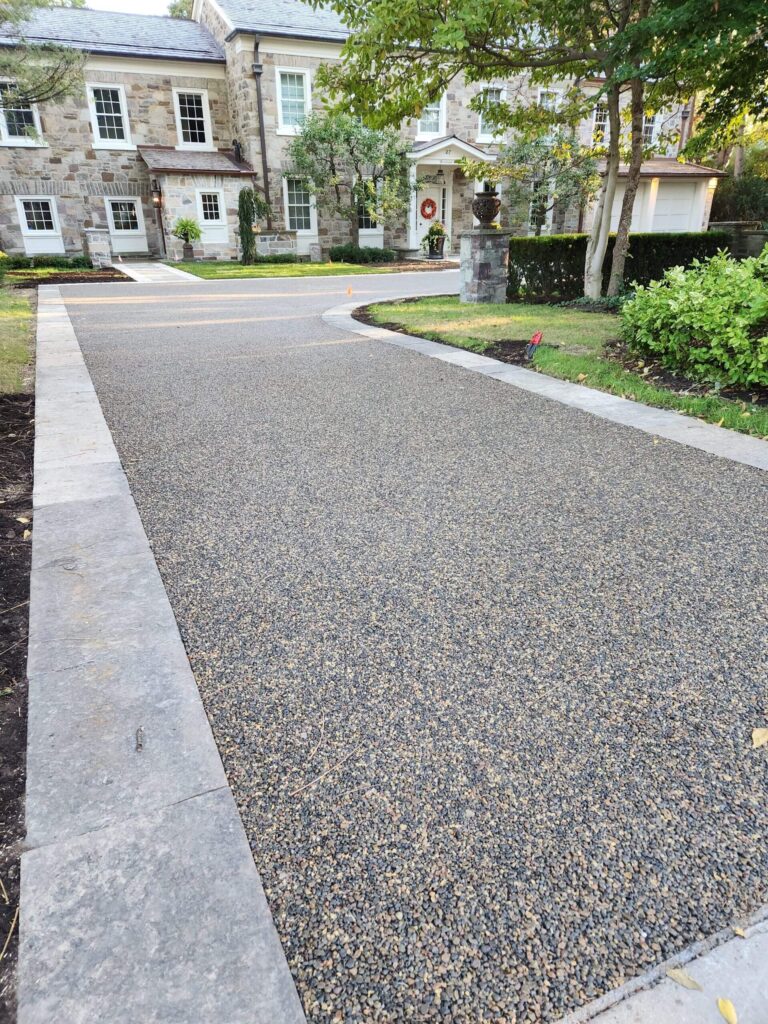BEST OPTIONS FOR PERMEABLE SURFACING
As urban environments grapple with the challenges of stormwater management, permeable surfacing emerges as a critical solution to mitigate runoff and its associated environmental impacts. Despite the clear benefits of permeable surfaces, the adoption of such systems in North America faces hurdles due to perceived drawbacks and concerns regarding their effectiveness. Here, we conduct an in-depth analysis of the known permeable surfacing options available in North America, exploring their strengths, limitations, and potential applications.
BEST PERMEABLE CONCRETE IN NORTH AMERICA
Initially touted as a promising solution, permeable concrete presents a paradoxical challenge. While concrete has long been revered for its structural integrity and versatility in urban construction, the removal of fine aggregates to achieve porosity compromises its fundamental strength and stability. Moreover, the necessity for a minimum thickness to support pedestrian traffic poses logistical challenges, with thicker pavements prone to particle accumulation and subsequent clogging. Post-installation, permeable concrete faces durability issues, with susceptibility to cracking and damage from environmental factors such as salt and frost/thaw cycles undermining its long-term viability as a permeable surfacing solution.
PERMEABLE ASPHALT
In contrast to permeable concrete, permeable asphalt offers a thinner alternative with similar structural limitations. Asphalt bitumen’s inherent properties render it ill-suited for effectively binding large aggregates, resulting in compromised integrity and susceptibility to stone loss, particularly in regions with high salt usage during winter. Despite its resilience to clogging, permeable asphalt remains vulnerable to environmental damage, diminishing its suitability for widespread adoption as a permeable surfacing option.
PERMEABLE PAVERS
Permeable pavers, characterized by increased spacing to facilitate water drainage, represent a versatile option for permeable surfacing. However, the practicality of permeable pavers is tempered by challenges such as rapid clogging and structural instability. The limited surface area ratio of permeable to sealed surface exacerbates runoff issues, while the inherent design flaws, such as spacing between pavers, contribute to displacement and uneven surfaces over time. Despite these drawbacks, permeable pavers remain a popular choice for localized permeable surfacing applications where aesthetics and flexibility are paramount.
PLASTIC GRID PAVING
Plastic grid paving systems offer a unique approach to permeable surfacing, leveraging grid structures to stabilize loose aggregate and facilitate water permeation. While these systems demonstrate strength and versatility, they are not without their limitations. Challenges such as loose aggregate migration and susceptibility to damage during snow removal detract from their practicality, particularly in regions with harsh winter climates. Despite these drawbacks, plastic grid paving systems remain a viable option for permeable surfacing in industrial and high-traffic areas where durability and flexibility are essential.
DECORATIVE EPOXY PERMEABLE SURFACING
Combining aesthetic appeal with functional performance, decorative epoxy permeable surfacing systems offer a visually striking solution to permeable surfacing challenges. However, their suitability for outdoor applications in winter climates is called into question due to inherent chemical properties that render them vulnerable to fracturing and stone loss. Ground movement and temperature fluctuations further compound these issues, limiting the durability and long-term viability of decorative epoxy permeable surfacing in outdoor settings.
WHAT ARE THE MOST POPULAR PERMEABLE DRIVEWAYS?
Porous, and previous are other words for permeable (You may remember the word from your school days). Permeability is a measure of how easily a fluid (water) can move through a porous surface.
Our main source of drinking water is mainly from groundwater, which is also an important resource for plants and trees. Over the decades, the amount of available groundwater has been depleted partly due to the impermeable surfaces installed in cities’ development. Impermeable surfaces don’t allow rain and melting snow to recharge groundwater. Infrastructure elements such as highways, walkways, roofs, driveways, and sports courts all keep water from recharging into the ground.
Since water can’t penetrate the concrete, asphalt, and other impermeable surfaces, water flows into storm sewage systems, into streams, and then eventually into our local bodies of water. During an ever-increasing flash storm, high volumes of this water run-off may lead to flooding, which can create costly damages. Furthermore, toxic pollutants, such as car oil or chemicals from pesticides, are picked up by runoff water from the pavement and dumped into nearby bodies of water, such as rivers, streams, and lakes, where our supply of drinking water becomes slowly contaminated and harms the environment.
RESIN BOUND AGGREGATE
Our favorite is resin-bound surfacing, which is made by thoroughly mixing aggregate stones with resin. A resin bound pavement is 100 percent fully permeable and, once cured, is flexible, thus making it resistant to cracking. Being a surface that is entirely permeable, resin bound surfacing is the most effective, in preventing flooding and puddles, even under flash storms.
Better yet, they are considered Low-maintenance, requiring brushing and occasional light hose/pressure washing. They are slip-resistant for safer spaces and adapt to any area and shape.
At Dream Pave, our resin bound surfaces come in a range of naturally designed granite colours, and we can incorporate design options such as patterns and borders. The resin we use in our process is Resin Bound Aggregate; We choose Resin Bound Aggregate since it is strong enough to handle vehicles, heavy trucks and machinery since it is highly durable.
PERMEABLE BLOCK PAVERS
Another option includes block pavers, which are also known as interlock, that are strategically placed with a small gap in between. These small gap, known as joints, allow water to flow through the cracks. Although not 100 percent permeable, they allow some water to soak into the ground. These blocks can bring unique patterns and color to your pavement and, as an option, can allow grass to grow through the gaps for a more rustic design. Out of the two, concrete pavers are sturdier than brick, but both are durable to heavy traffic. Adding concrete or brick pavers instead of any impermeable pavement can help you and the environment in the long run. For instance, allowing some water to soak back into the ground will keep the direct, and surrounding areas will need much less irrigation. That’s less work you need to do to maintain your lawn.
PLASTIC GRIDS
When searching for a less expensive alternative, consider using permeable plastic grid systems. These plastic grids are industrial strength and allow for 100 percent permeability when established correctly. The grids interlock and are filled with gravel. Some of these plastic grids are made from 100 percent recycled post-consumer plastic, making the product environmentally friendly starting from its manufacturing process.
PERVIOUS CONCRETE
Made from a mixture of stones and concrete, this is a porous material that is similar to the look and feel of concrete but is permeable. What you do need to keep in mind, is the maintenance required to keep sediment from accumulating in the pores. The accumulation may be too deep to be able to repair, and you may have to replace the pavement if it becomes impermeable due to clogging.
Once water runs off, water can no longer penetrate concrete and other impermeable surfaces; water is redirected into storm sewage systems, into streams, and then eventually into local bodies of water. Toxic pollutants, such as automobile fluids or pesticides, are picked up by run-off water from the pavement and dumped into nearby bodies of water, such as rivers, streams, and lakes, where our supply of drinking water becomes slowly contaminated and harms the environment.
THREE BEST OPTIONS FOR PERMEABLE DRIVEWAYS AMONG ALL
There are different options for permeable driveways to explore. The three most popular options for a permeable driveway are gravel-filled grid system, permeable pavers, and resin-bound aggregate. We will try to help you understand the most popular options and summarize the pros and cons of each.
Gravel filled Grids
Gravel filled grids are one of the less expensive surfacing options available. You can find different colours of gravel to fill the recycled plastic grid system, to create a permeable surface.
However, it does come with some drawbacks. The gravel is typically loose. Unless it is contained by some sort of resin bound structure, it is easily displaced, and replacing the gravel to maintain a somewhat smooth finish is a common occurrence. It’s also challenging to achieve a perfectly flat surface, and the final appearance is that of a plastic surface grid.
Permeable pavers (or Interlock)
Provided you use the proper paving stones with a required permeable base, pavers create a flat, hard-wearing, and permeable surface that will last for several years. Expect it to cost more than a gravel filled grid driveway, but offers the interlock look versus a plastic grid pattern.
The well documented drawback of permeable pavers is they are high maintenance compared to other types of surfacing. Only the joints are permeable, so the joints tend to clog quickly with natural debris such as leaves, dirt, etc. Another maintenance issue is having to lift and replace blocks to maintain a smooth surface, and ofcourse having to pull up the delightful weeds that grow in the joints.
IN SUMMARY
Regardless of which type of permeable surfacing you choose, it is crucial to ensure they are installed on top of a permeable sub-base. This sub-base acts as a storage area that holds water temporarily to avoid flooding on the surface level. As water drains through the top layer and the porous base, typically consisting of clean stone, pollutants in the water are naturally filtered before they soak back into the ground.
From a grass-paved pool to a permeable driveway, the options are endless when you open the doors to the possibilities for your property when you introduce permeable pavement. Permeable pavement is not only a problem-solver but definitely the best environmental choice, and it proves that we can incorporate permeable solutions that make our daily lives easier and are a sustainable pavement choice.

